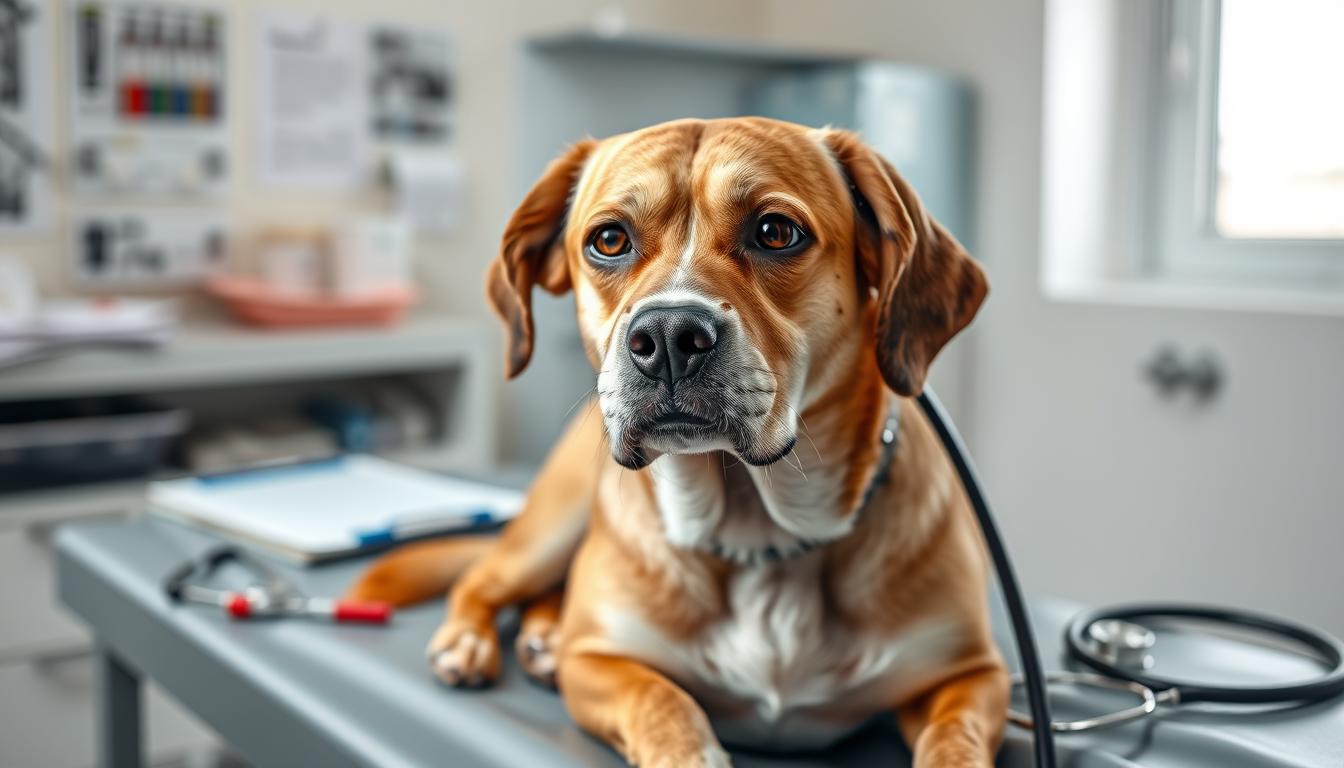As a dog owner, it’s key to know about common health issues in dogs. Spotting the signs and understanding the causes is crucial. This helps you care for your dog on time and avoid bigger problems. We’ll talk about common health issues, warning signs, and how to prevent them to keep your dog healthy.
Knowing about dog health problems is important for your pet’s care. Dogs can face many health issues, from small problems to serious ones. Being informed lets you act early to prevent or fix health problems. This way, your dog can stay happy and healthy.
Knowing about common health issues and taking steps to prevent them can help a lot. Regular vet visits, a good diet, and a healthy lifestyle are key. It’s also important to work with your vet to catch and treat health problems early.
Key Takeaways
- Understanding common canine health issues is crucial in providing timely care
- Recognizing signs and symptoms of dog health problems is vital in preventing complications
- Preventive measures, such as regular check-ups and a balanced diet, can reduce the risk of dog health problems
- Working closely with your veterinarian is essential in maintaining your dog’s health and wellness
- Staying informed about common canine health issues can help you take proactive steps in caring for your pet
- Early detection and treatment of dog health problems can significantly improve your pet’s quality of life
Understanding Common Dog Health Problems
Keeping your dog healthy means knowing about dog illnesses and canine diseases. Spotting them early can help your pet feel better and happier.
Physical Health Issues
Dogs can get infections, parasites, and injuries. Regular vet visits are key to catching these issues early and treating them well.
Behavioral Health Concerns
Behavioral problems like anxiety and aggression can come from stress or lack of training. Fixing these issues makes your dog’s life better and strengthens your bond.
Age-Related Problems
As dogs get older, they might get arthritis or have cognitive decline. Knowing about these canine diseases helps you care for them in their golden years.
| Dog Illness | Symptoms | Common Treatments |
|---|---|---|
| Arthritis | Limping, stiffness, reduced activity | Pain relievers, physical therapy |
| Anxiety | Excessive barking, destructive behavior | Behavioral training, anxiety medication |
| Parvovirus | Vomiting, diarrhea, lethargy | Supportive care, antiviral medications |
Early Warning Signs of Canine Health Issues
As a responsible pet owner, it’s crucial to spot signs of dog health issues early. Knowing about pet health concerns lets you act fast to fix problems.
- Changes in appetite or thirst
- Unusual lethargy or decreased activity
- Frequent vomiting or diarrhea
- Excessive scratching or licking
- Behavioral shifts, such as aggression or withdrawal
Watching for these signs of dog health issues can guide you to when to see a vet.
| Sign | Description |
|---|---|
| Appetite Changes | Sudden loss or increase in appetite can signal health issues. |
| Energy Levels | Unexplained tiredness or hyperactivity may indicate underlying problems. |
| Bathroom Habits | Alterations in urination or defecation frequency can be concerning. |
| Behavioral Changes | Aggression, withdrawal, or unusual behaviors can reflect health concerns. |
Digestive System Problems in Dogs
The digestive system is key to your dog’s health. Problems here can cause many dog health problems that harm their life quality.
Gastrointestinal Disorders
Common issues include gastritis, colitis, and inflammatory bowel disease. Signs like vomiting, diarrhea, and loss of appetite show these dog illnesses. It’s important to catch them early to avoid serious problems.
Food Sensitivities
Food sensitivities, like allergies and intolerances, often cause digestive problems. Symptoms can be itching, upset stomach, or chronic ear infections. Finding and avoiding the foods that cause these issues can help.
Dietary Requirements
A balanced diet is crucial for your dog’s digestive health. The right mix of proteins, fats, carbs, vitamins, and minerals can prevent many dog illnesses. Talk to your vet to create a diet plan that fits your dog’s needs.
| Disorder | Symptoms | Management |
|---|---|---|
| Gastritis | Vomiting, loss of appetite | Dietary adjustments, medication |
| Colitis | Frequent diarrhea, discomfort | Fiber-rich diet, probiotics |
| Food Allergies | Itching, digestive upset | Elimination diet, hypoallergenic food |
Skin and Coat Health Issues
Keeping your dog’s skin and coat healthy is key for their overall well-being. Many dog owners face skin problems, which are common health issues in dogs.
Dogs can get different skin conditions. These include allergies, parasites like fleas and ticks, fungal infections, and hormonal imbalances. Symptoms can be itching, redness, hair loss, and skin lesions.
- Allergies: Can be caused by food, environmental factors, or contact allergens.
- Parasites: Fleas, ticks, and mites can irritate the skin and cause discomfort.
- Fungal Infections: Conditions like ringworm affect the coat and skin health.
- Hormonal Imbalances: Issues like hypothyroidism can lead to poor skin and coat condition.
Regular grooming is crucial to prevent these issues. Brushing your dog’s coat removes dead hair and spreads natural oils, making it shiny. A balanced diet is also important for skin health. It should include essential fatty acids for a strong, glossy coat.
- Regular Brushing: Helps prevent matting and removes allergens.
- Balanced Diet: Ensures your dog receives necessary nutrients for skin health.
- Parasite Prevention: Use veterinarian-recommended treatments to protect against fleas and ticks.
At-home care is important, but knowing when to seek professional help is equally crucial. If your dog shows persistent symptoms like severe itching or unexplained hair loss, consulting a veterinarian is recommended.
| Condition | Symptoms | Treatment |
|---|---|---|
| Allergies | Itching, redness, sneezing | Allergy management plans, dietary changes |
| Parasites | Itching, visible fleas or ticks | Topical or oral parasite preventatives |
| Fungal Infections | Red, scaly patches, hair loss | Antifungal medications, medicated shampoos |
| Hormonal Imbalances | Thinning coat, lethargy | Hormone therapy, dietary supplements |
Respiratory Problems in Dogs
Respiratory issues are common dog illnesses that can affect your pet’s quality of life. Understanding these canine diseases helps in early detection and effective treatment.
Common Breathing Issues
Dogs may suffer from kennel cough, which causes a persistent cough, or allergies that lead to sneezing and itching. Breeds with short noses, like Bulldogs, often experience brachycephalic airway syndrome, making breathing difficult.
Emergency Warning Signs
Be alert for severe coughing, wheezing, or labored breathing. These signs indicate serious canine diseases that require immediate veterinary attention to prevent complications.
Treatment Options
Treatments vary based on the severity of the condition:
- Home Remedies: Use a humidifier and ensure your dog rests in a calm environment.
- Medical Interventions: Veterinarians may prescribe medications or perform surgeries for chronic conditions like brachycephalic airway syndrome.
Maintaining good air quality and minimizing exposure to irritants can significantly reduce the risk of respiratory problems in dogs.
Joint and Mobility Concerns
As dogs get older, they often face joint and mobility issues. These problems can really affect their happiness and health.

Arthritis, hip dysplasia, and ligament injuries are big concerns for dogs. Spotting these problems early is key to helping them feel better.
- Limping: Favoring one leg over others.
- Stiffness: Trouble moving after resting.
- Reluctance to Exercise: Not wanting to play like they used to.
Many things can lead to these pet health concerns. Genetics, being overweight, and past injuries are some of them. Keeping your dog at a healthy weight helps their joints. Also, regular, gentle exercise keeps their muscles strong.
- Weight Management: Helps avoid too much pressure on joints.
- Appropriate Exercise: Keeps joints flexible.
- Joint Supplements: Helps with cartilage health.
- Medical Treatments: Includes vet-prescribed meds and therapies.
Spotting and treating joint problems early is important. It helps your dog stay active and comfortable.
| Condition | Symptoms | Management |
|---|---|---|
| Arthritis | Joint pain, swelling, reduced movement | Anti-inflammatory meds, weight control, physical therapy |
| Hip Dysplasia | Difficulty rising, limping, decreased activity | Supplements, surgery, controlled exercise |
| Ligament Injuries | Limping, instability in the joint, swelling | Surgery, rest, rehab exercises |
Dental Health and Oral Problems
Keeping your dog’s teeth clean is key to their health. Bad oral hygiene can cause serious problems that harm their life quality.
Common Dental Issues
Dogs face many dental issues, like periodontal disease. This causes gum inflammation and bone loss. Tooth decay and infections also happen, causing pain and eating troubles.
Signs of dental problems include bad breath, swollen gums, and loose teeth. If not treated, these issues can get worse, leading to bigger health problems.
Preventive Care
To prevent dental problems, regular care is essential. Brushing your dog’s teeth often removes plaque. Dental chews can also help by reducing tartar and strengthening teeth.
Regular vet cleanings are also important. They ensure your dog’s teeth are well taken care of. By focusing on dental health, you help your dog stay healthy and happy for a long time.
Identifying Emergency Health Situations
Knowing when your dog needs urgent care can save their life. Spotting the signs of dog health issues early helps you act fast.
Critical Symptoms
- Severe bleeding
- Difficulty breathing
- Seizures
- Sudden collapse
When to Contact a Vet
Not every dog health problem needs immediate help. But, some symptoms are urgent. If your dog shows any of the critical signs, call your vet right away.
If your dog has less severe signs, watch them closely. If the problem doesn’t get better or gets worse, get professional advice.
Preventive Healthcare Measures
Keeping your dog healthy means taking steps ahead of time. Regular vet visits are key to preventing dog health problems. They help catch issues early and keep shots current.
It’s also vital to protect your dog from parasites. Use treatments recommended by your vet to fight fleas, ticks, and worms. A diet that fits your dog’s needs helps their health and energy too.
Exercise is another important part of dog wellness. It keeps your dog at a healthy weight and strong. Daily walks, play, and games keep them both physically and mentally sharp.

Sticking to a preventive care plan can make your dog live longer and happier. Here’s a quick list of key preventive steps:
| Preventive Measure | Benefits |
|---|---|
| Regular Vet Check-ups | Early disease detection and vaccination updates |
| Parasite Prevention | Protection against fleas, ticks, and intestinal worms |
| Proper Nutrition | Supports immune system and overall health |
| Regular Exercise | Maintains healthy weight and strong muscles |
Understanding Vaccinations and Immunizations
Vaccinations are key in keeping dogs healthy and safe from diseases. Making sure your dog gets all their shots helps them stay well. It also helps keep the whole community safe.
Core Vaccines
Core vaccines are a must for every dog, no matter their life. They protect against serious and common diseases.
- Rabies: Stops a deadly virus spread by bites.
- Distemper: Keeps dogs safe from a contagious virus that harms the lungs and brain.
- Parvovirus: Helps fight a virus that causes bad stomach problems.
- Adenovirus: Stops infections that can harm the liver and lungs.
Vaccination Schedule
It’s important to follow a good vaccination schedule. Puppies start getting shots at six weeks old. They need boosters every three to four weeks until they’re about 16 weeks old. Adult dogs need booster shots to keep their immunity strong.
- Puppy Shots: Start at 6-8 weeks, then every 3-4 weeks.
- Adult Boosters: Every 1-3 years, based on the vaccine and vet advice.
Risk Factors
Your dog’s life, where they live, and their health decide what shots they need. Dogs that go outside or meet other animals might need extra shots. Always talk to your vet to make sure your dog gets the right shots for their needs.
Diet and Nutrition Impact on Health
A balanced diet is key for dog wellness and helps avoid dog health problems. It keeps energy up, supports growth, and boosts the immune system.
Dogs need proteins, fats, carbs, vitamins, and minerals to stay healthy. Their needs change with age, size, breed, and health. Puppies need more protein for growth, while older dogs need less to avoid obesity.
- Proteins: Essential for muscle development and repair.
- Fats: Provide energy and support skin and coat health.
- Carbohydrates: Supply energy and aid in digestive health.
- Vitamins and Minerals: Crucial for various bodily functions and overall health.
Common diet issues include obesity and malnutrition. Obesity can lead to diabetes, joint problems, and heart disease. Malnutrition weakens the immune system and can stunt growth.
When picking dog food, check the labels to ensure it’s right for your pet. Choose foods with quality ingredients and avoid fillers or artificial additives. Spotting signs like a dull coat or lethargy means it’s time to change your dog’s diet.
| Nutrient | Function | Sources |
|---|---|---|
| Proteins | Muscle growth and repair | Chicken, beef, fish |
| Fats | Energy and coat health | Fish oil, flaxseed |
| Carbohydrates | Energy and digestion | Rice, barley, sweet potatoes |
| Vitamins | Immune support and metabolism | Vegetables, fruits |
| Minerals | Bone health and enzyme function | Calcium, phosphorus |
Exercise and Physical Activity Guidelines
Regular exercise is key for dog wellness. It keeps them healthy and prevents problems. It’s important to match the exercise to your dog’s age.
Age-Appropriate Exercise
Puppies need short play sessions to build energy and coordination. As they grow, dogs enjoy longer walks and different activities. Senior dogs should have gentle exercises like easy walks and play.
Activity Recommendations
- Daily walks or runs
- Interactive games like fetch or tug-of-war
- Agility training and obstacle courses
- Swimming for low-impact exercise
- Mental stimulation through puzzle toys

Regular physical activity helps with weight control, heart health, and behavior. It also strengthens your bond with your dog. Watch for signs of too much exercise, like heavy panting or limping. Adjust their activities to keep them balanced.
Regular Health Monitoring Tips
Watching your dog’s health closely helps catch problems early. Regular checks can solve many pet health concerns before they get worse.
At-Home Health Checks
Doing routine checks at home lets you spot odd changes fast. Here’s what to look at:
- Skin and Coat: Watch for lumps, bumps, or odd shedding.
- Eyes and Ears: Check for discharge, redness, or infection signs.
- Teeth and Gums: Make sure there’s no too much tartar or gum swelling.
- Body Condition: Check your dog’s weight and muscle tone for changes.
Knowing what’s normal for your dog helps you see signs of dog health issues more easily.
Professional Check-up Schedule
Seeing the vet regularly is key to keeping your dog healthy. Here’s a standard schedule:
- Puppies: Monthly visits until they’re one year old for shots and growth checks.
- Adult Dogs: Annual visits to check health and update shots.
- Seniors: Bi-annual visits to manage age-related pet health concerns and screen for common diseases.
Regular vet visits are vital for early detection and treatment. They help keep your dog healthy for a long time.
Working with Your Veterinarian
Having a good relationship with your vet is key for tackling dog health problems and pet health concerns. The right vet gives your dog the care they need, tailored just for them.
Before you go to the vet, make a list of any odd behaviors or symptoms your dog has. Talking clearly helps your vet figure out what’s wrong.
- Describe symptoms clearly and in detail.
- Ask specific questions about your dog’s condition and treatment options.
- Discuss any ongoing concerns or changes in behavior.
- Follow the recommended treatment plans diligently.
Regular vet visits are important for keeping your dog healthy and catching problems early. Your vet can help manage long-term health issues and handle emergencies.
| Age Group | Recommended Check-ups | Focus Areas |
|---|---|---|
| Puppies (0-1 year) | Every 3-4 weeks until 16 weeks old | Vaccinations, growth monitoring, behavioral training |
| Adults (1-7 years) | Annually | Dental health, weight management, routine screenings |
| Seniors (7+ years) | Every 6 months | Joint health, organ function, cognitive assessments |
Conclusion: Maintaining Your Dog’s Health and Wellness
Keeping your dog healthy is a journey that never ends. It starts with noticing early signs of illness. By watching your pet closely, you can catch health problems early.
Preventing health issues in dogs requires good food, exercise, and vet visits. A diet that fits your dog’s needs keeps them healthy and full of energy.
Exercise is key to keeping your dog active and strong. It helps their joints and muscles. Also, regular vet visits help catch and manage health problems.
As a pet owner, you play a big role in your dog’s health. Knowing about dog health and working with your vet makes your dog’s life better.
By following these tips, you not only keep your dog healthy but also strengthen your bond. The happiness of having a healthy dog is a big reward for caring pet owners.
FAQ
What are the most common dog health problems?
Dogs often face issues like arthritis, skin allergies, and dental disease. They can also have gastrointestinal and respiratory problems. Keeping an eye out for these signs and regular vet visits are key to their health.
How can I recognize early signs of health issues in my dog?
Watch for changes in appetite, lethargy, and excessive scratching or licking. Also, look for breathing issues and changes in bathroom habits. Being alert can help spot problems early.
What preventive measures can I take to avoid dog health problems?
Regular vet visits and a balanced diet are crucial. Make sure your dog gets enough exercise and stays up-to-date on vaccinations. Good dental care also plays a big role in their health.
When should I take my dog to the veterinarian for health concerns?
Call your vet for severe symptoms like vomiting, breathing trouble, sudden weight loss, or seizures. Regular check-ups are also important for catching health issues early.
What dietary requirements are essential for maintaining my dog’s digestive health?
Dogs need the right mix of proteins, fats, carbs, vitamins, and minerals. The best diet varies based on your dog’s age, size, and health. Talk to your vet to find the right diet for your dog.
How does regular exercise impact my dog’s health and prevent illnesses?
Exercise helps keep your dog’s weight in check and boosts heart health. It also reduces behavioral problems and keeps their mind sharp. Regular exercise is key to preventing many health issues.
What are the essential vaccinations my dog needs for disease prevention?
Dogs need vaccines for rabies, distemper, parvovirus, and adenovirus. Depending on your dog’s life, more vaccines might be needed. Vaccines are vital in keeping your dog safe from serious diseases.
How can I maintain my dog’s skin and coat health?
Regular grooming and a balanced diet with essential fatty acids are important. Preventing parasites and treating skin allergies or infections quickly also helps. Healthy skin and a shiny coat show your dog is well.
What should I do in case of a pet health emergency?
For emergencies like severe bleeding, breathing trouble, seizures, or sudden collapse, get to the vet fast. Quick action can save your dog’s life.
How often should I perform at-home health checks on my dog?
Check your dog’s health weekly. Look at their skin, coat, eyes, ears, teeth, and body condition. This helps catch health issues early.

